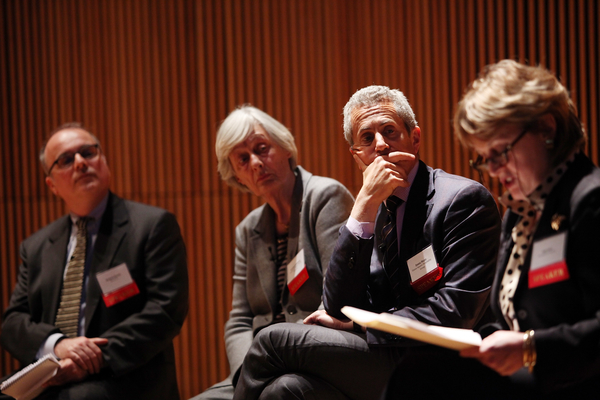
While corporate philanthropy has long ago shifted from community charity to strategic, carefully designed programs, a fundamental question of authenticity can undermine the soundest strategies.
If the association between a company and a cause, or the social impact of the company's action does not resonate with consumers and other stakeholders, what is the point of the best-laid plans?
This question was examined at a recent panel convened by Barron's and the Luxury Marketing Council, a collaborative organization of leading brands. Discussion was led by journalist and author Richard C. Morais, editor of Barron's Penta, a quarterly magazine and website serving wealthy families. In this context, Morais addressed the inherent contradiction facing luxury brands and philanthropy -- high end products are often marketed as expressions and rewards for one's self, and this can create dissonance for philanthropic projects focused on others. Customers of these brands are also often philanthropists themselves and they are attuned to these inconsistencies.
As Page Snow, Chief Philanthropic Officer at Foundation Source, illustrated, "Individuals of wealth are approached constantly for various causes, and their BS detector becomes very finely tuned, especially at higher levels of wealth."
Alignment sets the stage for genuine and successful partnership. Snow offered advice to those of us on the asking side of this equation: she pointed out that younger family philanthropists are looking out for how their foundations' assets are being invested just as much as how their grants are being made. They want their portfolios to align with their own values, just as much as their grantees. Even more important, they are not looking for non-profits to fund. They are looking for problems to solve.
She went on to analyse recent luxury cause marketing campaigns for alignment and authenticity. RuPaul and Viva Glam: great match. While one of the most inauthentic of recent campaigns, she said, was Komen and KFC. Curing cancer through products that contribute to obesity and cancer just doesn't fly.
Photo from left: Richard C. Morais, Editor of Barron's Penta; Jasmine Audemar, Audemar Piguet; Danny Meyer, Union Square Hospitality; and Page Snow, Foundation Source. Photo courtesy of Rogers Kisby Photography.
Sometimes the alignment simply fits the company's DNA. Illustrating this was Jasmine Audemars, Chairman of Audemars Piguet, a Swiss watch manufacturer that supports global sustainability projects. "Time evokes the evolution of geology" according to Piguet. As head of their corporate foundation, Audemar and the board direct its resources toward forest preservation around the world as well as in their own backyard in Switzerland's Jura.
And on the corporate side, they built the first industrial building in Switzerland to receive the Minergie Eco label. Sustainability advocates are embedded within each department to help improve the company's processes. None of the foundation projects are used to overtly promote watches, the corporate image or otherwise fit a "strategic" marketing or communications objective. So, while the foundation work informs the corporate work, it is not used as a marketing gimmick.
Danny Meyer highlighted a staff-based philanthropy approach. Employees at his Union Square Hospitality Group restaurants are hired primarily based on their "Hospitality Quotient," their desire and happiness in serving others. Even in his business's early days when Union Square was being redeveloped, he and his staff engaged with the community by serving free lunches to organizers and farmers market advocates. Each restaurant manager and staff choose their own local philanthropy, and Danny himself has several in which he is involved, such as Share Our Strength and City Harvest.
This focus on employee engagement comes back to a core focus of Union Square Hospitality Group: it all starts with employees, not customers, investors or anyone else. Staff that is continuously engaged and challenged is central to the company's business growth.
With a focus on fulfilling one's employees, public recognition for philanthropy becomes secondary. Union Square Hospitality has sponsored the Big Apple Barbecue in Madison Square Park for years. After all, nearby Blue Smoke is one of their restaurants. But only lately have they actually put their name on it.
But one occasion where they are stepping forward as a brand is the DeVine Intervention campaign for Hurricane Sandy relief that recently closed. Wine suppliers have donated lots valued at $250,000 for an online auction benefiting recovery. The timing was felt to be important...offer an infusion of cash for those suffering the longer term effects of the storm.
So the question all of us engaged in philanthropic partnerships should ask is, "What problem am I solving, and how am I being authentic about it?" Only then will a cause find its voice, and its true partners.
